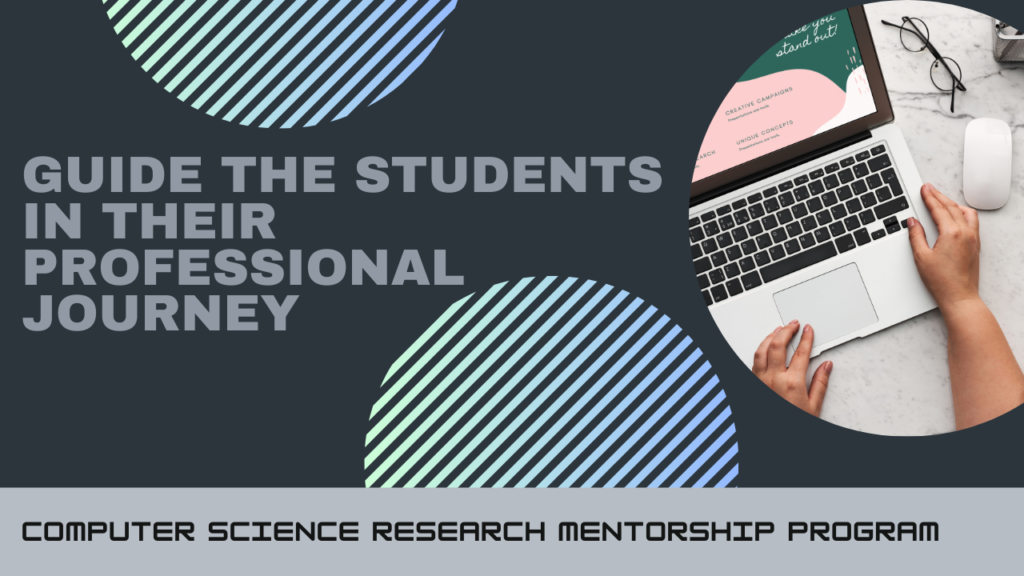Computer Science Research Mentorship Program:-
Introduction:
In the ever-changing field of computer science, where technology is developing quickly and innovation is a constant, mentorship programs have become essential resources for aspiring professionals. Beyond traditional schooling, mentoring offers individualized counseling, information transfer, and a connection between the classroom and practical application. This in-depth article delves into the realm of computer science mentorship programs, examining their importance, advantages, and a few noteworthy cases that have influenced the careers of many people.

Understanding Mentorship in Computer Science:
A mentoring relationship is one in which a more experienced person (the mentor) gives a less experienced person (the mentee) knowledge, skills, and guidance. Students can investigate their research interests and gain greater understanding of the subjects they choose under the guidance of a mentor. Mentors and students create a special bond via studying challenging subjects together and using problem-solving skills. Mentoring is crucial in the field of computer science for developing talent, encouraging creativity, and tackling the field’s always changing issues.
ASSISTS PUPILS IN SHINE:
Computer science research mentoring programs give students the chance to stand out on their professional profiles as well as college applications. It not only demonstrates their enthusiasm for computer science but also their aptitude and willingness to go further into their area of interest.
Joining in research mentoring programs for computer science is absolutely helpful, even though it may be challenging to stand out amid the competition given the popularity of computer science as a field and major that is still growing. In this study, the participants were computer science back, the students were gated chances, so the demonstration was in the field.
Key Components of Mentorship Programs:
- Personalized Guidance:
Mentors provide personalized assistance, adjusting guidance and recommendations to the mentee’s unique requirements and objectives. Tailored supervision guarantees that mentees obtain focused support in areas like academic endeavors, job advancement, and skill development.
- Knowledge Transfer:
Experienced mentors facilitate the transmission of information and practical advice since they bring a plethora of industry insights and expertise to the table. By being exposed to real-world situations, mentees obtain insights that go beyond the purview of formal education.
- Career Development:
Mentorship programs help mentees define goals, acquire new skills, and make strategic decisions by offering them a career development road map. Mentors provide insightful guidance and lessons on navigating the professional landscape by sharing their own career trajectories.
- Networking Opportunities:
By putting mentees in touch with researchers, business executives, and possible partners, mentoring provides access to important networks within the computer science community. By networking, the mentee can reach a wider range of prospects and become more visible.
AI Research Mentorship Initiatives:
AI Scholars is a live, online summer and spring program for high school students who are interested in programming. Students of all skill levels are invited to apply. There are 10 sessions in the program, which adds up to 25 hours. Pupils can gain further knowledge about the applications of artificial intelligence in real-world scenarios. Mentors with a specialty in artificial intelligence, who are either Stanford alumni or current graduate students, provide guidance to students through the AI project.

Benefits of Mentorship Programs in Computer Science:
- Accelerated Learning: By utilizing their mentors’ wealth of knowledge, mentees can expedite their learning process. Mentors’ knowledge and practical experience enable mentees to acquire concepts and skills that may take years to acquire independently. The ability of mentoring to expedite learning and assist mentees in efficiently managing the obstacles of their academic and professional pathways is one of its key benefits.
- Career Guidance: For mentees navigating the complex terrain of computer science job options, mentoring acts as a compass. Mentors provide insightful information about a range of businesses, expertise, and possible career pathways. Through providing well-informed guidance, this mentorship helps mentees align their career objectives with the diverse array of computer science opportunities.
- Skill Enhancement: Mentors play a pivotal role in the continuous improvement of both technical and soft skills. By offering constructive feedback, mentors guide mentees in honing their abilities. This feedback loop is crucial for skill enhancement, ensuring that mentees not only excel in technical aspects but also develop the interpersonal and communication skills essential for success in the professional realm.
- Professional Growth: One of the main drivers of comprehensive professional growth is mentoring. In addition to their technical knowledge, mentors help develop more general abilities like leadership, effective communication, and problem-solving. A well-rounded professional who can flourish in the complex field of computer science can be developed through the mentor-mentee relationship.
- Motivation and Confidence: The increase in self-assurance and motivation that mentoring offers is one of the subtle but incredibly important benefits. Mentedees thrive in an environment that is supported and encouraged by their mentors. Mentorees are inspired to set and achieve lofty objectives, overcome obstacles, and approach their academic and professional undertakings with tenacity and determination by this newfound confidence. Professional and personal development are greatly accelerated by the mentor’s faith in the mentee.
Research Mentorship Program at UC Santa Barbara:
High school students participate in experiential learning opportunities in university-level research worldwide, according to the UC Santa Barbara Research Mentorship Program. Students can work with graduate students, professors, or postdoctoral supervisors of their choice thanks to the curriculum’s vast range of research projects across multiple areas.
GOOGLE’S COMPUTER SCIENCE RESEARCH MENTORSHIP PROGRAM (CSRMP):
By taking part in Google’s Computer Science Research Mentorship Program, students can collaborate with academically similar classmates while being supervised by a Google mentor with training. Throughout the program, students can attend private conversations with the Google mentor and take part in discussions with their small group.

Notable Mentorship Programs in Computer Science:
- Google’s Mentorship Programs:
Google Summer of Code (GSC):
A global program that offers stipends to university students for working on open-source projects during the summer.
Mentees collaborate with experienced mentors, gaining hands-on experience and contributing to open-source development.
Google AI Residency:
An intensive research training program focused on machine learning and artificial intelligence. Mentees work alongside prominent researchers and engineers, contributing to cutting-edge projects in AI.
2. In Higher Education:
| Undergraduate | PhD Fellowship |
| Availability of research mentorship programs in different organizations. | Fellowship program offered by Microsoft, tailored for doctoral students engaged in research related to computer science. |
| Engage students in different programs of related research to improve their skills. | The program is designed to support and elevate the academic and research pursuits of these students. |
| Improve student productive ability in their further education | The mention of mentorship by Microsoft Research professionals underscores the significance of guidance from experienced individuals in the field. |
3. AnitaB.org Mentorship Programs:
Anita B. org’s Mentorship Program:
Connects women in technology with experienced mentors who guide them in their professional journeys.
Aims to address the gender gap in technology by fostering supportive mentor-mentee relationships.
Hopper Academy:
Offers a structured mentorship program for women seeking to enhance their skills in software engineering.
Mentees collaborate with industry professionals, receiving guidance on technical and career development.
4. ACM-W Student Chapters:
ACM-W (Association for Computing Machinery – Women) supports student chapters worldwide, fostering mentorship and networking opportunities.
Student chapters often organize mentorship programs, connecting students with professionals in the field.
5. Open-Source Mentorship Programs:
Numerous open-source organizations, including Mozilla, The Linux Foundation, and the Apache Software Foundation, administer mentorship programs. These initiatives offer chances for individuals to actively participate in open-source projects while being guided by seasoned mentors.
AMAZON SUMMER UNDERGRADUATE RESEARCH EXPERIENCE (SURE)
Students get the opportunity to be part of an 8 to 10 weeks SOR program at the university of their choice where they are guided by the faculty of that university. Students create their own research plan by supporting professionals and top researchers in computer science and STEM. Under the guidance of distinguished faculty members at their preferred university, SURE program participants get the opportunity to customize their research projects and mold their academic careers.

Initiating a Successful Mentorship:
- Clarify Goals:
This phase highlights how crucial it is for mentees to articulate their goals and expectations for the mentorship in detail. Mentees provide the foundation for a targeted and intentional mentoring experience by coordinating these objectives with their academic and professional ambitions. Well-defined objectives offer a path forward for both the mentor and the mentee, guaranteeing that the mentorship is customized to the individual’s unique requirements and aspirations.
- Effective Communication:
Any mentorship’s ability to succeed is mostly dependent on communication. In this case, encouraging honest and open communication between mentors and mentees is the main goal. It is encouraged for both sides to raise any issues, share expectations, and offer helpful criticism. By having an honest conversation, mentors and mentees build a strong, cooperative relationship that helps mentors better understand their needs and mentees interact with their mentors.
- Commitment to Learning:
This concept emphasizes how mentees actively participate in their own growth. Mentees must approach the connection with a commitment to lifelong learning; mentoring is not a passive experience. Mentees can make the most of their mentorship opportunity by actively seeking assistance and aggressively working on their personal and professional development. This maximizes their potential for growth and skill advancement.
- Regular Check-Ins:
Frequent check-ins are crucial for monitoring development, spotting obstacles, and adjusting objectives as necessary. This continuous communication enables mentors to offer advice in accordance with the mentee’s changing needs. Additionally, it gives mentees the chance to ask questions, celebrate victories, and work through any problems they might be having. Maintaining a regular communication stream guarantees that the mentorship is adaptable to the changing circumstances of the mentee’s path.
- Feedback Mechanism:
Establishing a feedback mechanism is crucial for maintaining a healthy mentor-mentee relationship. Both parties should feel comfortable providing constructive feedback. This mechanism allows mentors to understand the impact of their guidance and adjust their approach if necessary. Similarly, mentees can communicate their preferences and suggest improvements. A feedback loop promotes a culture of continuous improvement and ensures that mentorship remains mutually beneficial.
Conclusion:
Computer science research mentoring programs have a significant impact on how future professionals in this subject are shaped. Through extensive research, insightful mentoring from seasoned mentors, and accelerated learning and career growth, these programs offer mentees a structured and encouraging atmosphere. Beyond the classroom, the advantages include skill development, career counseling, and the building of a welcoming and varied community in the dynamic field of computer science.

